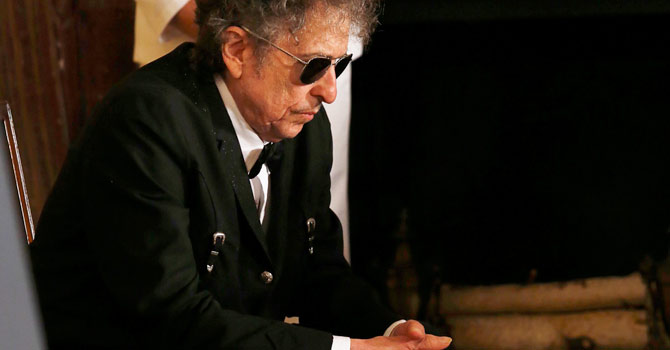
Bob Dylan says the stigma of slavery ruined America and he doubts the country can get rid of the shame because it was “founded on the backs of slaves.”
Bob Dylan told in a recent interview with Rolling Stone Magazine that in America “people are at each other’s throats just because they are of a different color, it will hold any nation back.” He went on to say that black people know that some white people “didn’t want to give up slavery.”
Dylan continued with, “If slavery had been given up in a more peaceful way, America would be far ahead today.”
When asked on his opinion if President Barack Obama was helping to shift a change, Dylan said: “I don’t have any opinion on that. You have to change your heart if you want to change.”
My third choice of songs from Bob Dylan’s new album is the “angry speech”, Pay in Blood. I call it an angry speech because it is clearly a man with lot on his mind who vents his thoughts in this song, or maybe it is three men? It is not a story-song (as such), this is someone’s view of their world at a particular moment. This man is, Bob Dylan, on one level. It’s about his life, but it is also so much more. Again I think it paints a picture of Americas past and present.
I’ve read a lot about how people interpret this song on different web sites, it’s very fascinating. The Point of view can be several types of men, and I am not gonna list everyone here, but these are the ones I find most believable:
Bob Dylan himself
A Soldier comming home from war
A hitman/assassin kind of guy
The Crucifixion of Jesus
There are definitely biblical references in the song and the title Pay in Blood has to be a refernce to blood offerings in the Jewish religion or the importance of The Blood of Christ in Christianity, but my take on the song is that it is about what Bob Dylan recently told Rolling Stone, that USA was built on “the back of slaves” they (USA) paid in blood but not thir own.
Lyrics w/references:
I imagine three storytellers:
The Slave
The Master (USA)
Bob Dylan (The Commentator/The People of today)
The Slave:
Well I’m grinding my life out, steady and sure
Nothing more wretched than what I must endure (1)
I’m drenched in the light that shines from the sun
The Master:
I could stone you to death for the wrongs that you done
Sooner or later you make a mistake,
I’ll put you in a chain that you never will break
Legs and arms and body and bone
I pay in blood, but not my own.
The Slave:
Night after night, day after day
They strip your useless hopes away (2)
The more I take, the more I give
The more I die, the more I live
The Master:
I got something in my pocket make your eyeballs swim
I got dogs could tear you limb from limb
I’m circlin’ around the Southern Zone (3)
I pay in blood, but not my own.
The Slave:
Low cards are what I’ve got
But I’ll play this hand whether I like it or not
I’m sworn to uphold the laws of God
You can put me out in front of a firing squad
The Master:
I’ve been out and around with the rowdy men
Just like you my handsome friend
My head’s so hard, must be made of stone (4)
I pay in blood, but not my own.
Bob Dylan (The Commentator/The People of today):
Another politician pumpin’ out the piss
Another ragged beggar blowin’ you a kiss
You’ve got the same eyes that your mother does
If only you could prove who your father was
Someone must’ve slipped a drug in your wine
You gulped it down and you crossed the line
Man can’t live by bread alone (5)
I pay in blood, but not my own.
The Slave:
How I made it back home, nobody knows
Or how I survived so many blows
I’ve been through hell, what good did it do?
You bastard! I’m supposed to respect you?
The Master:
I’ll give you justice, I’ll fatten your purse
Show me your moral virtue first
Hear me holler and hear me moan (6)
I pay in blood but not my own.
Bob Dylan (The Commentator/The People of today):
You pet your lover in the bed
Come here, I’ll break your lousy head
Our nation must be saved and freed
You’ve been accused of murder, how do you plead?
This is how I spend my days
I came to bury, not to praise (7)
I’ll drink my fill and sleep alone
I play in blood, but not my own.
notes:
(1) The Poems of Exile: Tristia and the Black Sea Letters by Ovid. The same page includes a line that Dylan used in the song “Workingman Blues #2” on his Modern Times album:
(2) In the previous example line two of the first verse of the Tempest song “Pay In Blood,” which is “Nothing more wretched than what I must endure,” comes from Ovid. In this example you can see Ovid being used to craft line two of verse two. Dylan’s line is, “They strip your useless hopes away.” This example comes from Book III of The Black Sea Letters:
I found the two Ovid references on Scott Warmuth’s Pinterest page, a big thank you to him.
(3) “Snow-Bound” by John Greenleaf Whittier
There’s no coincidence that this man is quoted in a song with this topic, he was was an influential American Quaker poet and ardent advocate of the abolition of slavery in the United States.
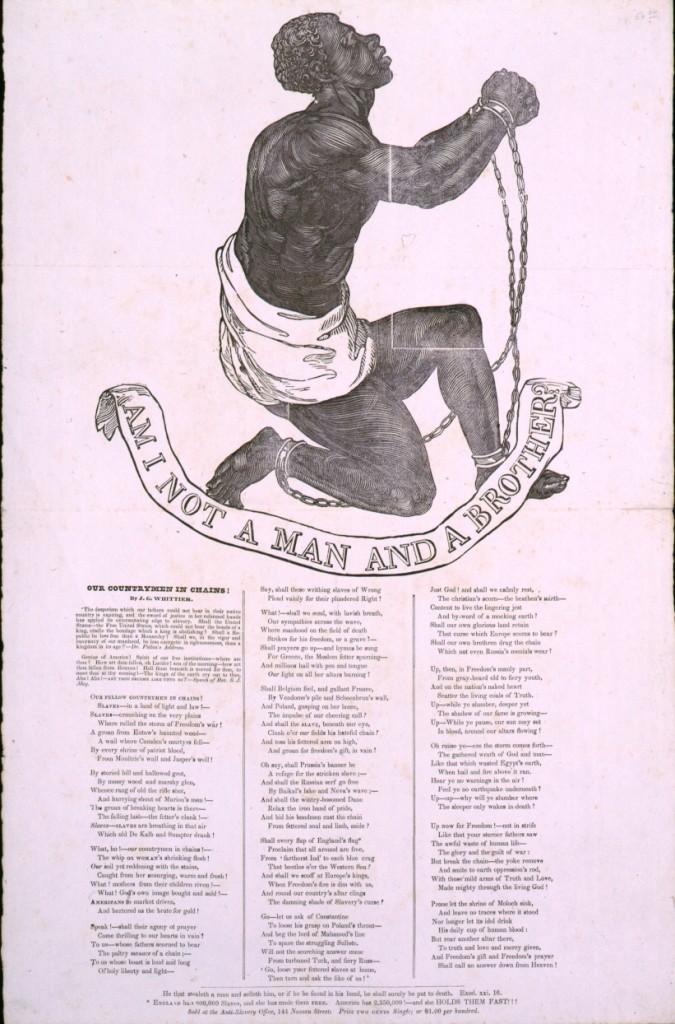
Am I not a Man and a Brother – John Greenleaf Whittier
(4) Ezekiel chapter 3 verse 9. Ezekiel is told by the Lord to go to the house of Israel, a very stubborn and hard-headed people. The Lord promises to make Ezekiel as hard-headed as they are. If you continue to read this passage it goes on to say that Ezekiel is made a watchman by God. The watchman’s responsibility is to warn the people about impending disaster. If they don’t listen then the blood is on their own heads. If the watchman fails to warn the people their blood is on his head.
(5) Deuteronomy 8:3 ; Matthew 4:4 and Luke 4:4) We all need a deeper meaning.
(6) This could be from Willie Dixon’s – I can’t quit you baby. Bob Dylan has a long history of referencing old songs:
Whoa when you hear me moanin’ and groanin’, you know it hurts way down inside
Oh when you hear me hollrin’, ooh you know my love will never die, alright
(7) “I came to bury, not to praise” – ref. Mark Antony in Julius Caesar: “I come to bury Caesar, not to praise him.” The Shakespeare connection again.
Well, this is how I see it, please comment and tell me about references that I’ve missed.
– Hallgeir

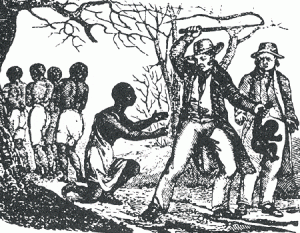
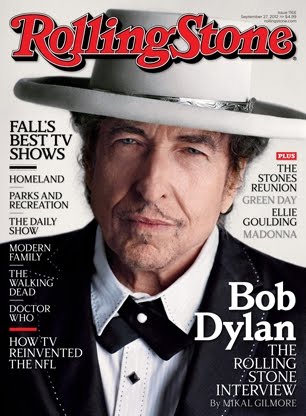
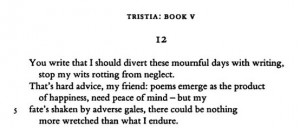
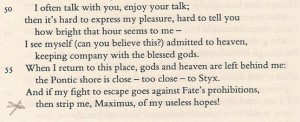
On first hearing this I instinctively heard it as the voice of a greedy investment banker post-2008 (i.e. my friends in government will make sure the poor pay the price for my sins, but maybe this only happened in the UK) but this doesn’t make much sense after further listening.
Now I’ve read this I see that any interpretation that assumes a single voice doesn’t seem to make much sense. If the narrator has righteous revenge on his mind then why does he feel he has to pay for his actions? Although it sounds like one person (maybe it won’t anymore) it does read like there is more than one person talking. Very interesting, thanks.
My interest has also been piqued by the casual suggestion that there may be more to Tempest & Roll on John than there seems to be. I’ve always thought the album would’ve been better without these tracks and save a slight inkling that the John in question could be a biblical John masquerading as Lennon, I’ve not paid much attention.
Thanks! I love this tune from Bob and those inspirations he has pulled together.
I do hope that Bob Dylan will provide his thinking and sources to us fans….I know he does not “need” or “have” to out of any obligation, but it would be another gift he can bestow on us….
Please?
In my opinion the album “Tempest” is built around the illustrations, poems and writings of William Blake. Blake was a radical, opposed to establishment Christianity but deeply captivated by the working class Evangelical movements in England, the so-called First Awakening that opposed slavery. Like Blake, Dylan populates his “Songs of Experience” that make up “Tempest” with a host of characters steeped in the full range of emotions that make up our world, on the one hand defiled and corrupted, on the other hand capable of producing great religious prophets. It is interesting that Blake illustrated Dante’s “Divine Comedy” because in many ways “Tempest” is a kind of Divine Comedy.
Very interesting, and I especially like the Divine Comedy connection. I believe you’re right!
– Hallgeir
Mr Dylan’s use of other lines from other writers or poets is possible a poetic version of the thing many a Modern Jazz player and improviser has done for some years when they put into a tune an 8 bar quote fromm another song. Given the amount of stuff Mr Dylan may have read in his life to date, who knows what may be in is memory banks. As he lets us into those “banks” and his fertile imagination as he releases his albums from time to time, “we” are the richer for his efforts, and I for one am grateful for the work and effort.
That is so true!
It is very interesting that you compare it to jazz, I linked it to the folk tradition, but you’re of course right. It is jazzmelody in verbal form. It make sense!
Thank you
– Hallgeir
Thank you.
Hallgeir, I’m a relative newcomer to your site, which pains me to admit since I’ve loved Bob since the mid-seventies and Visions of Johanna is one of my favorite tunes of his. Found you through Expecting Rain, and should have had enough common sense to jump to your site much sooner. I really appreciated your analysis of Pay in Blood as well as the insightful comments of your readers. Love your master-slave interpretation; it made me want to go back to Pay in Blood and listen to it a few times tonight. Great stuff. Thanks.
Thank you for the very kind words!
…it is such a pleasure to get people who so clearly love music, to read what we write and to get comments on what we write.
This is why we do it, the love of music and the opportunity to reach out and make people to go back and play “that song” over again.
Thanks again for your feedback
🙂
– Hallgeir
One other comment…as you mention here, Ezekial is made a watchman by God. A watchman also appears in the song, “Tempest”.
Yes I’ve noticed that to, thank you for the comments!
Greatly appreciated!
– Hallgeir
Interesting thoughts across the board here. I’d like to raise a thought regarding the issue of plagiarism…which in the folk and blues tradition is no issue. I noticed something the other day when I was trying to listen to Tin Angel on YouTube. When I searched for it, I found Joni Mitchell’s song of the same title. I think it is fair to say that Mitchell has been one of the most vociferous critics of Dylan in regards to plagiarism. I also think she and Dylan had a tryst, or some sort of relationship, at some point. I think there is some connection between Bob’s song “Tin Angel” and Ms. Mitchell’s song of the same name. I leave it to others to sort out what that is. I’d be interested in hearing comments.
I have read about more Joni Mitchell references on Tempest (just have to find them again) and I do believe it is Dylan taking a little stab at Joni for calling him unoriginal. He gets even “more unoriginal”/traditional in his songwriting and he point out that Joni Mitchell herself is not unfamiliar to this kind of song writing. Our man, Dylan, can be a harsh opponent.
Some thoughts on Roll on John to get you going…
I love the use of Blake’s messianic ‘tyger’ in the beautiful ‘Roll on John’.
There’s also John 5 v.35 (kjv) where Jesus speaks of John the Baptist: ‘he was a burning and a shining light’ as a more revealing influence/allusion. Dylan once more taking on the messianic “voice”!
Thank you for the comment,
I am working on Roll on John but it is a complicated song, more complicated than I thought at first!
…but it will come 🙂
– Hallgeir
A very interesting take, thanks for this.
What I appreciate most in your analysis is the way it makes structural sense of the song. I’m noticing that more and more as I listen to the album. I think “Tempest” and “Roll On John” have a similar quality, as being more thought through than a first, or casual, listen might disclose.
I also think this is pretty clearly a statement about the state of our civilization at this parlous moment
.
Thank you for the comment, always nice to get feedback.
I was also thinking about Roll on John as my next project for analysis, time will tell
Again, thanks for the feedback
– Hallgeir
I think the song just as easily could be from one voice. Bob definitely is in character to a great extent, though the passion in the singing makes me feel he identifies deeply with the character(s). To pin it down to the specific voices you mention is one (good) interpretation of many. I see it as more of a cry of despair, a desire for vengeance and role reversal, from “the countless confused, accused, misused, strung-out ones an’ worse” against their enemies.
I think your interpretation is interesting, and I was a bit on the same track at first, but then I read his Rolling Stone interview and “connected the dots” (sort of…)
Thanks for the feedback!
– Hallgeir
Your analysis and interpretation is sound, but the overarching problem with this song and I would say the entire album, is that it needs to be analyzed and interpreted, not heard and appreciated. Breaking the song into three storytellers works in a deconstructive academic way, but the song as sung, does not present these three voices. There is only one voice, the singers, crooning in first and second person.
Many of Dylan’s songs are lyrically hard to understand during initial listenings. However, they are grounded in strong visual realities of places and things. This song has no actual realities. Instead, it is filled with visceral emotionality. That’s not a bad thing, but it leaves the listener ungrounded, searching for a meaning and discovering any meaning will do.
In sum, I like your interpretation, but the song itself fails to achieve the importance you place upon it.
—
“Praise be to Nero’s Neptune, the Titanic sails at dawn”
Praise be to Bob Dylan for giving us such raw meat to sink our into.
Thanks for the comments.
I did struggle with this song for some time, I don’t mind that. I still enjoy it while listening to it. I actually was out driving the car, when the song suddenly made sense to me.
I do not think that the album needs to be analyzed, I do it for fun, and I think I could have enjoyed it just as much without disecting the lyrics.
I aggree that it is diffucult to hear three distinct voices, but now that I have the story straight I imagine to myself that I can hear a different tone in the singing of the master and the slave. It could just be my imagination running away with me.
I do think that the song is good, not the best on Tempest, but for me it is the third best song on the album.
Again, thank you for taking the time to comment, and providing us with interesting insights.
– Hallgeir
The references might be multiplied , but your point hardly improved. The use of voices in juxtaposition without naming them is in ample use throughout this album and proves how once again Dylan shows he is a master in songwriting, and the debate about plagiarism can also be put to rest, because you show how the texts only get more depth through the use of these scources. Furthermore I would like to point to how the whole album tells a story, once again, as he has done before, and which is why he sometimes leaves out a song, as good as it is on its own, when it does not serve the thematic whole.
Thanks for the feedback, and I aggree with what you’re saying,
I think we see the framework of a “consept” album (yes, the dreaded word is out) about that state of western civilazition/America.
I also aggree about his clever use of quotes and little snippets throughout the album, the depth just gets greater and the puzzles more fascinating.
Several of the quoted poets/texts are put into more than one song, making a unified idea/feel of the album, but also underlining the importance that Dylan puts into them.
– Hallgeir